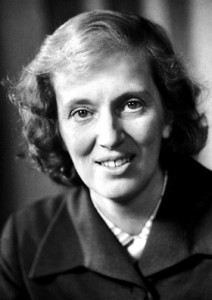
Dorothy Hodgkin: One chemist among many worthy of a household name.
I like to play a game whenever meeting someone new. I try and guess what the reaction will be when it’s discovered I am a chemist. The most common response is a look of terror and disgust, and the inevitable, “Oh I hated chemistry in high school!” The other most likely alternative is: “Does that mean you can make crystal meth?” (Thank you, Walter White.) Rarely is there an enthusiastic response. I can’t help but think this is partially due to the fact that the most visible chemist in 21st-century popular culture is the meth-cooking high school teacher of Breaking Bad, while other science disciplines have glamorous celebrities such as Stephan Hawking, Neil deGrasse Tyson, Bill Nye the Science Guy, etc. (Termed ‘The Sagan/Tyson Problem’ by blogger Chemjobber). Could this a mere coincidence, or is chemistry the unpopular kid no one wants to be friends with? Is it the very nature of the subject, or are chemists doing something to isolate ourselves form the general public?
Discussion on the topic has not yielded any definitive answers. But it is my opinion that inherently, chemistry simply does not have the same overarching appeal that a subject such as astrophysics has. Astrophysics and physics tend to look at a world much larger than us, while chemists generally focus on a world a million times smaller, and without a previous understanding of chemistry it can be harder to appreciate the magnitude of contributions that come from work that is done on such a microscopic level.
For example, in 1946 Dr. Dorothy Hodgkin discovered the atomic structure of penicillin via x-ray crystallography. She won the Nobel Prize in Chemistry for this discovery in 1964, and five years later solved the structure of insulin. She did this by bombarding penicillin and insulin crystals with x-rays and analyzed how the light waves bent around the electrons to determine the arrangement of the atoms. The determination of the atomic structure yielded from these experiments meant that a three dimensional formation was found and exponentially increased knowledge about the compounds. Modern medicine is in overwhelming debt to this woman, yet still she is not a household name. Because of her contributions, we have been able to synthesize penicillin and fully develop it as a widely used antibiotic, and we have consequently gone through a golden age of antibiotics in which many penicillin-based compounds were designed. And as the incidence of diabetes continues to rise, Hodgkin should again be thanked as her molecular determination of insulin has provided a great deal of pharmacological insight into the hormone and we are still heavily dependent on it today as diabetes research continues.
However, one of the big problems with chemistry is that topics such as atomic structure, protein crystallization, x-ray diffraction, and others can be exciting and groundbreaking to those familiar with the fields and their respective difficulties, but without a science background there is little to no appeal. It is generally more attractive to look at a picture of the planets and galaxies and think abstractly than it is to think about microscopic molecular interactions. But this is not our only problem, as we lack visibility as well as interest. We have yet to find someone who can generate public interest and excitement, someone who can make chemistry sexy and appealing. Though perhaps as suggested by blogger Chemjobber and Senior Editor of Chemical & Engineering News Dr. Carmen Drahl, we may actually need ‘Chemistry Avengers’: a group of people who can reach different communities instead of depending on one person.
But before we have someone, or several people, to rally behind, we need to make chemistry more accessible. Unlike other scientific disciplines, the ‘cool-ness’ factor is not blatantly obvious. We also struggle against the fear and dislike many have of chemistry. By triggering painful flashbacks to high school courses or being vilified by alternative health advocates and poor media representation, there is already a preconceived bias against chemistry. One idea to counteract this bias has been presented by Ashutosh Jogalekar, as he proposes a chemistry lobby to build a National Center for Chemical Education so that the word ‘chemistry’ does not evoke reminders of high school molarity problems but has the power to conjure the same sense of wonder that we get when thinking about a ‘God particle.’ Like all sciences, chemistry and the chemical industry have the power to do a lot of harm. However there are so many positive things accomplished by the industry and researchers that we need to keep in mind. We would not be capable of making it throughout the day without utilizing the multitude of incredible chemical discoveries and inventions we have available to us, and even though chemistry has yet to find its spokesperson(s), we should not let that stop us from being impressed.
